备考2011高效学习方案英语高二册:unit 20 archaeology
文档属性
| 名称 | 备考2011高效学习方案英语高二册:unit 20 archaeology | 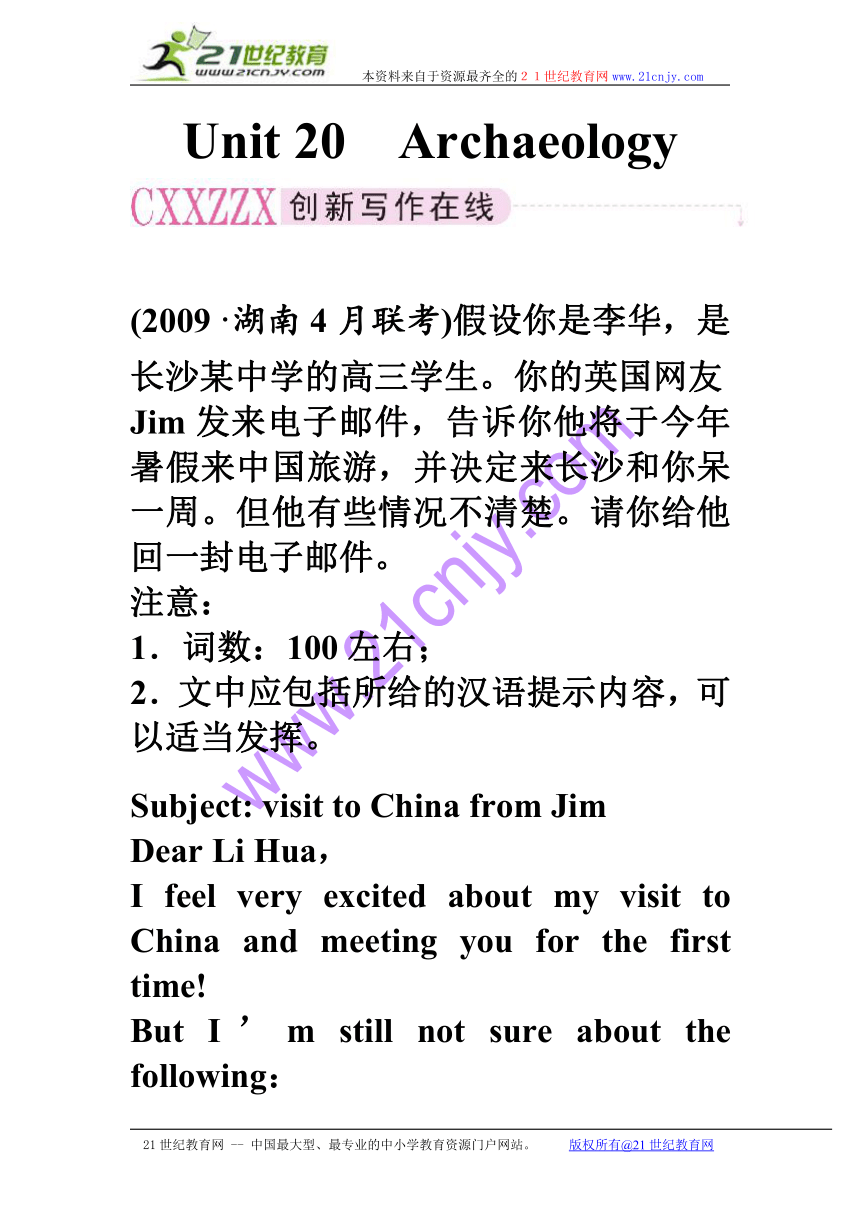 | |
| 格式 | rar | ||
| 文件大小 | 195.1KB | ||
| 资源类型 | 教案 | ||
| 版本资源 | 人教版 | ||
| 科目 | 英语 | ||
| 更新时间 | 2010-12-14 17:11:00 | ||
图片预览

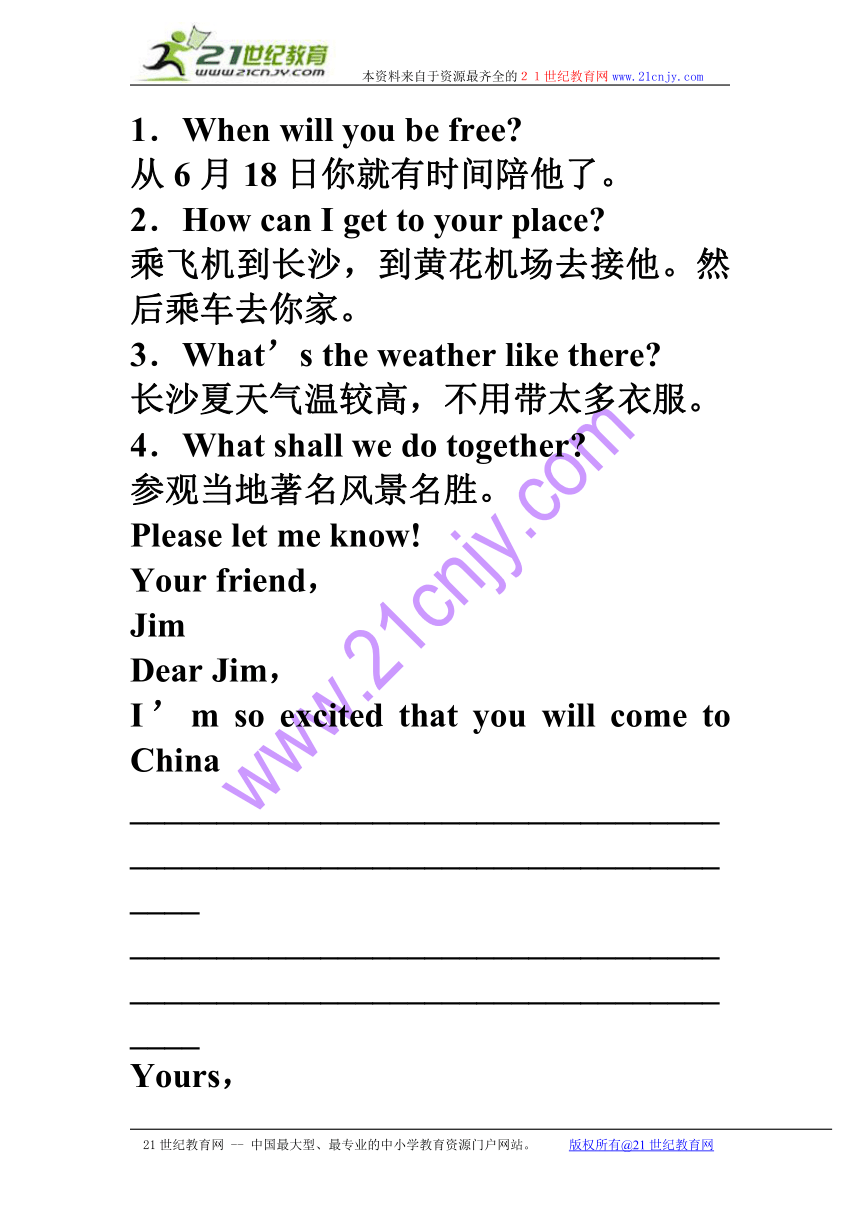
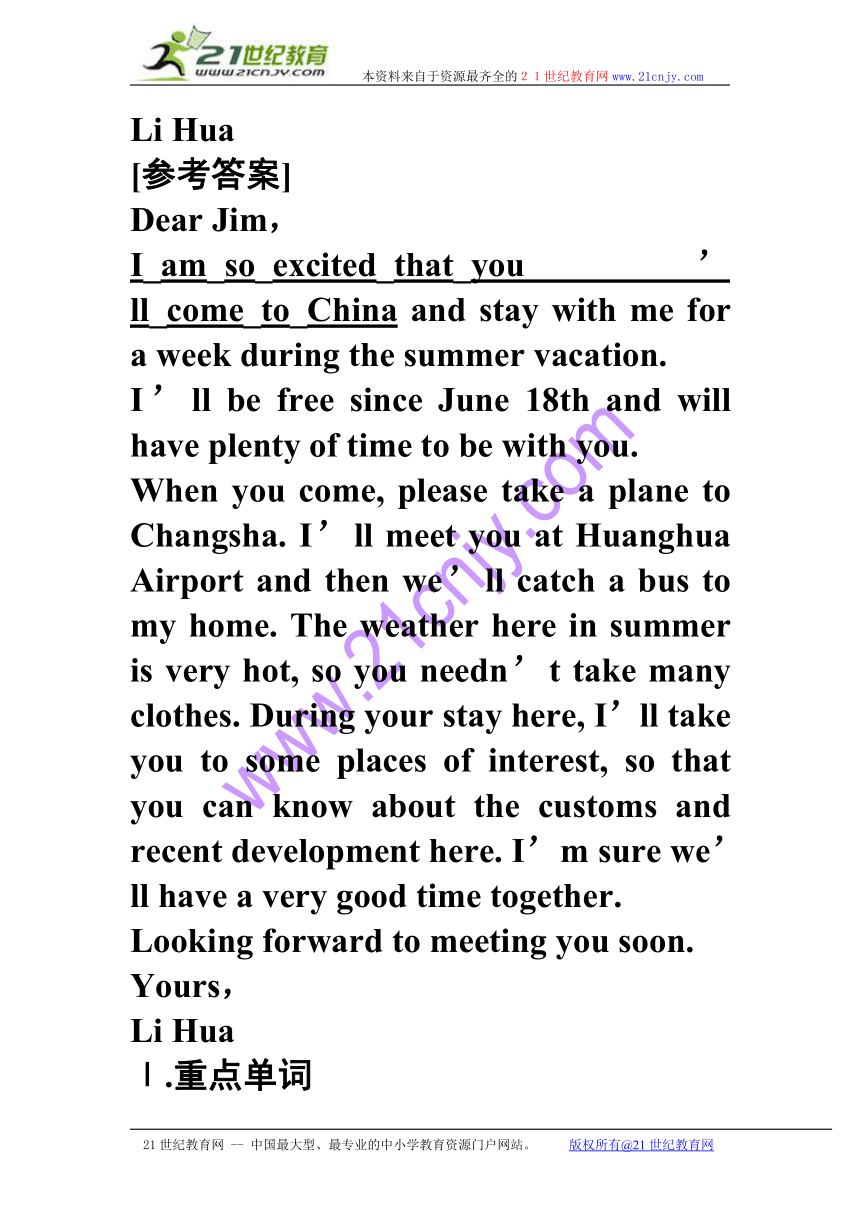
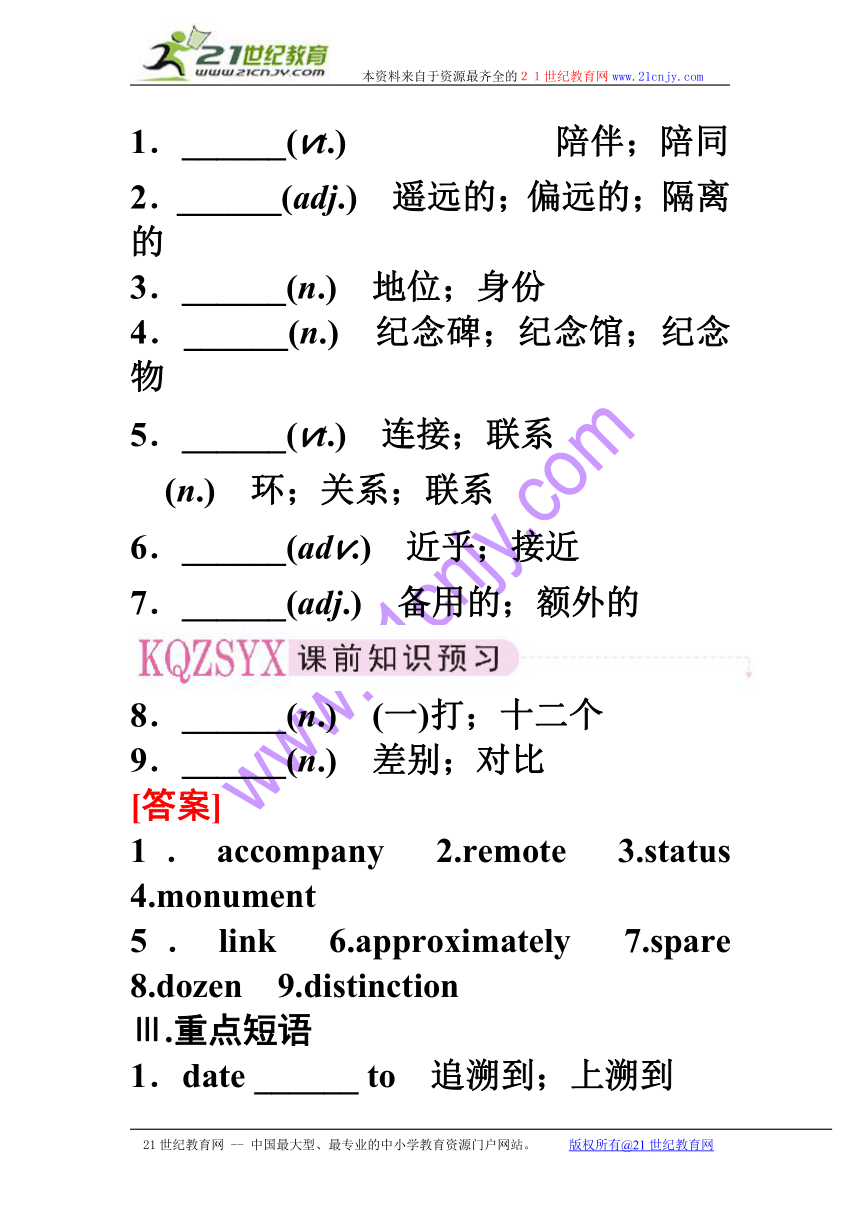
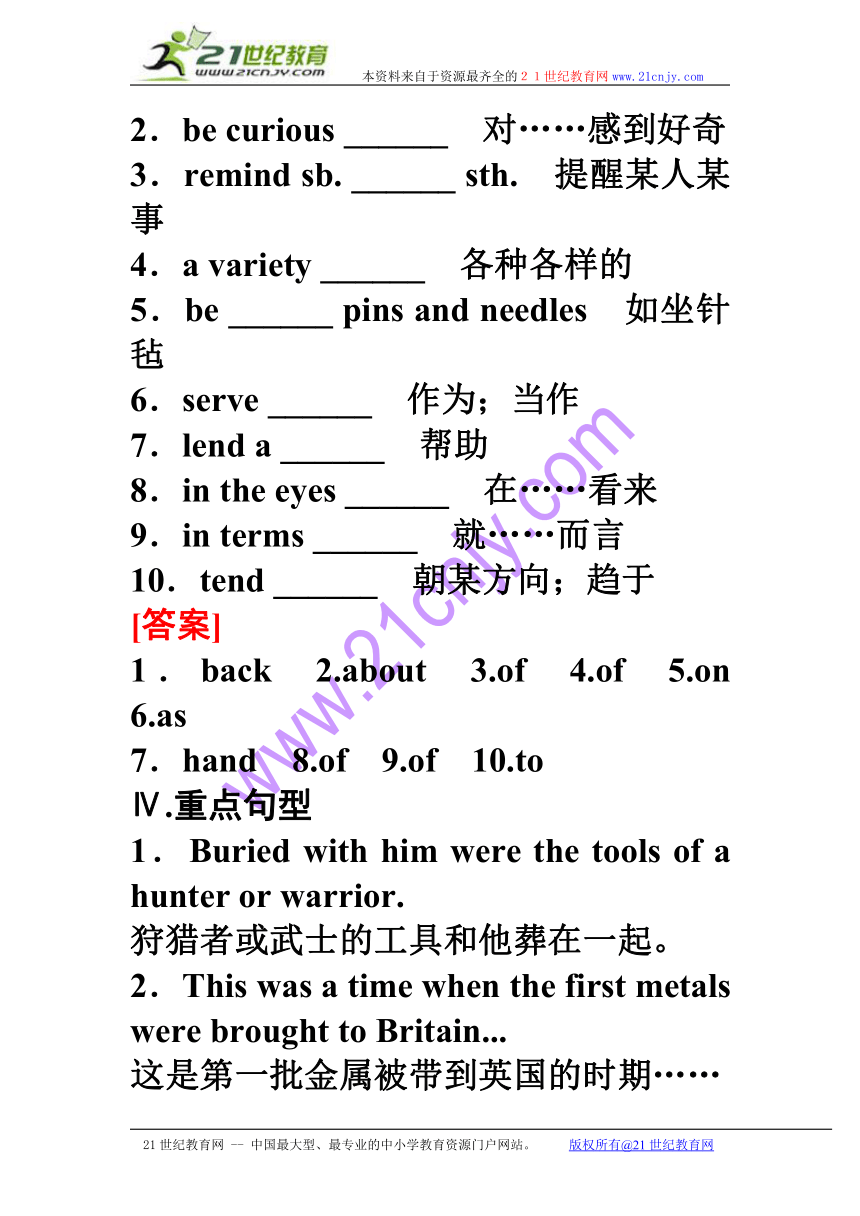
文档简介
本资料来自于资源最齐全的21世纪教育网www.21cnjy.com
Unit 20 Archaeology
(2009·湖南4月联考)假设你是李华,是长沙某中学的高三学生。你的英国网友Jim发来电子邮件,告诉你他将于今年暑假来中国旅游,并决定来长沙和你呆一周。但他有些情况不清楚。请你给他回一封电子邮件。
注意:
1.词数:100左右;
2.文中应包括所给的汉语提示内容,可以适当发挥。
Subject: visit to China from Jim
Dear Li Hua,
I feel very excited about my visit to China and meeting you for the first time!
But I’m still not sure about the following:
1.When will you be free
从6月18日你就有时间陪他了。
2.How can I get to your place
乘飞机到长沙,到黄花机场去接他。然后乘车去你家。
3.What’s the weather like there
长沙夏天气温较高,不用带太多衣服。
4.What shall we do together
参观当地著名风景名胜。
Please let me know!
Your friend,
Jim
Dear Jim,
I’m so excited that you will come to China ________________________________________________________________________
________________________________________________________________________
Yours,
Li Hua
[参考答案]
Dear Jim,
I_am_so_excited_that_you’ll_come_to_China and stay with me for a week during the summer vacation.
I’ll be free since June 18th and will have plenty of time to be with you.
When you come, please take a plane to Changsha. I’ll meet you at Huanghua Airport and then we’ll catch a bus to my home. The weather here in summer is very hot, so you needn’t take many clothes. During your stay here, I’ll take you to some places of interest, so that you can know about the customs and recent development here. I’m sure we’ll have a very good time together.
Looking forward to meeting you soon.
Yours,
Li Hua
Ⅰ.重点单词
1.______(vt.) 陪伴;陪同
2.______(adj.) 遥远的;偏远的;隔离的
3.______(n.) 地位;身份
4.______(n.) 纪念碑;纪念馆;纪念物
5.______(vt.) 连接;联系
(n.) 环;关系;联系
6.______(adv.) 近乎;接近
7.______(adj.) 备用的;额外的
8.______(n.) (一)打;十二个
9.______(n.) 差别;对比
[答案]
1.accompany 2.remote 3.status 4.monument
5.link 6.approximately 7.spare 8.dozen 9.distinction
Ⅲ.重点短语
1.date ______ to 追溯到;上溯到
2.be curious ______ 对……感到好奇
3.remind sb. ______ sth. 提醒某人某事
4.a variety ______ 各种各样的
5.be ______ pins and needles 如坐针毡
6.serve ______ 作为;当作
7.lend a ______ 帮助
8.in the eyes ______ 在……看来
9.in terms ______ 就……而言
10.tend ______ 朝某方向;趋于
[答案]
1.back 2.about 3.of 4.of 5.on 6.as
7.hand 8.of 9.of 10.to
Ⅳ.重点句型
1.Buried with him were the tools of a hunter or warrior.
狩猎者或武士的工具和他葬在一起。
2.This was a time when the first metals were brought to Britain...
这是第一批金属被带到英国的时期……
3.Perhaps the most important fact about the King of Stonehenge is that his homeland was somewhere in Central Europe.
也许关于巨石王最重要的事实是他的家乡在中欧的某个地方。
Ⅴ.重点语法
Review the Use of “It”(复习it的用法)
Ⅰ.词汇聚焦
1.average adj. 平均的,n. 平均数;一般水平,v. 平均(是);平均做(得到)
[思维拓展]
above (the) average在平均水平以上
below (the) average在平均水平以下
on (the/an) average平均
up to the average达到平均水平
work out an average算出平均数
an average student一个水平一般的学生
①The average of 3, 8 and 10 is 7.
②His school work is well above average.
③We receive 20 letters a day on average.
He is nothing special. He’s only the ______ man in the street.
A. average B. usual
C. general D. common
解析:average可以表示“普通的”,相当于ordinary; usual强调惯例,与以往一样;general表示“一般的,大概的”;common指“常见的,共有的”。
答案:A
2.tend v. 有……倾向/习惯;倾向于,趋于;照料,看护,服侍
[思维拓展]
tend to do sth.往往容易干某事
tend towards/to倾向于;趋于……
tend to sb./sth.照料,护理某人/某物
①It tends to rain here a lot in the spring.
②The nurse tended to the soldier’s wounds.
Janet ______ get angry if you disagree with her.
A. willing to B. get ready to
C. tends to D. leads to
解析:本题题干意义为“如果你和詹妮特意见不合,她会发脾气的”。get ready to 表示“愿意干某事”;lead to表示“导致”;A项为非谓语动词。
答案:C
3.quantity n.量;数量
a large quantity of(或quantities of)+名词(可数或不可数)“大量的”;能接可数与不可数名词的短语还有:a lot of, lots of“许多的”,plenty of“许多的”,some“一些”。
He lost a great quantity of blood.他流了大量的血。
This factory has quantities of water pipes.这家工厂有大批的水管。
[指点迷津]
①“a large quantity of+名词”充当主语时,其谓语动词的数取决于of后面的名词;接不可数名词时,其谓语动词亦用单数,反之,用复数。
②“quantities of+名词”充当主语时,其谓语动词总是用复数形式。
As a result of destroying the forests, a large ______ of desert ______ covered the land.
A. number; has B. quantity; has
C. number; have D. quantity; have
解析:a large number of通常修饰可数名词,a large quantity of修饰可数名词和不可数名词,desert是不可数名词,答案要在B和D中选择;本题句子的主语是desert,谓语动词要用单数,故B项正确。
答案:B
4.spare adj. & v. 多余的,剩下的,额外的;抽出(时间),剩下
[思维拓展]
enough and to spare绰绰有余
spare money多余的钱
in one’s spare time在某人的业余时间
spare sb. a few minutes为某人抽出几分钟时间
spare no effort不遗余力地
have 10 pence to spare还剩10便士
①We haven’t got a spare room for guests in our house.
②Can you spare me a ticket
③Can you spare me a few minutes to help me
—Excuse me, may I ask you some questions
—Sorry, I’m too busy and haven’t even a minute to ______.
A. spend B. spare
C. share D. stop
解析:“我太忙了,甚至连一分钟也挤不出来。”A、C、D三项皆与原意不符。此处使用spare表示“挤出、抽出、匀出”之意。
答案:B
5.link v. 连接,联系;用环连接 n. 环节;关系
[指点迷津]
link(up) with=connect with“与……相连接”,通常指“水域”相通时用前者,“车辆、道路、交通”相连时用后者;join(...to...)指“直接相连(两个以上的东西)”;adjoin to“与……毗邻”。
There the irrigation canal ______ the reservoir which is very important to the villagers.
A. connects with B. links up with
C. joins to D. adjoins to
解析:connect with表示车辆、道路相连;link up with表示水域相连;join to指直接相连两个以上的东西;adjoin to指两者毗邻。句意为:这条灌溉渠在那儿与水库连接起来。
答案:B
Ⅱ.短语突破
1.in terms of
[思维拓展]
in terms of用……的话,以……措词;根据,依照
come to terms达成协议;妥协,让步
on good terms with sb.交情很好
on bad terms with sb.交情不好
on speaking terms with sb.交谈投机
on the long term就长远而言
①I’m not on good terms with her.
②If I agree to do it, it will be on my own terms.
Now I’m no longer working for him; we can meet ______.
A. on good terms B. on equal terms
C. on speaking terms D. in equal terms
解析:本题意义为“我不再为他工作,因而可以和他平等相处了。”此时terms与on搭配使用。
答案:B
2.in a position在……位置;处于……境地
[思维拓展]
in an attacking position处于进攻位置
be in position在适当的位置
in a most uncomfortable position
以一种非常不舒服的姿势
in second position第二名
a position in an oil company一家石油公司的职位
take the position that-clause采取……的立场/态度
①This player usually plays in an attacking position.
②The shelves are held in position by metal brackets.
③He had to work in a standing position.
Is it fair that she is out of ______ only because she is out of ______?
A. a situation; condition
B. job; position
C. work; place
D. a job; situation
答案:A
3.send away把……送往别处
[思维拓展]
send out发送,派遣;发出(光、热等);长出(叶子等)
send off(=see off)给……送行
send forth发出(光、热等)
send up发射,使……上去
send for派人去请,派人去拿
①All this almost sent him mad.
②The sun sends out light and heat.
③There was a large crowd to send him off.
④He sent his son away to school in Germany.
4.belong to vi. 属于,为……所有
[思维拓展]
“属于,拥有”的表达方式:
He has a car of his own.
He possesses a car of his own.
He owns a car of his own.
The car belongs to him.
[指点迷津]
belong to不能用于被动语态。如:
China is a developing country belonging to the third world.中国是个发展中国家,属于第三世界。
Remember to put the book where it ______.
A. is belonged B. is belonged to
C. belongs D. belongs to
解析:belong是vi., belong to是及物动词短语,但也没有被动形式,可除去A、B选项。本题考查的belong后又没有宾语,所以不选D项,故C选项是正确的。
答案:C
5.dig up翻挖,挖掉
[思维拓展]
dig tunnel挖地道
dig a well挖井,打井
dig in挖战壕
dig into深入钻研
dig out翻出,找出,挖出
①These relics(文物) were dug up last year.
②They were attacked before they had time to dig in.
5.do wrong做错事
[思维拓展]
do no wrong不做错事
to know right from wrong辨别是非
do wrong to sb.=do sb. wrong冤枉某人
in the wrong不对的,应受谴责的
go wrong(adv.)走错了路;搞错;弄错;开始失败
get sb. wrong误会/误解某人
do good to sb.=do sb. good对某人有益
do sb. a favour=do a favour for sb.帮某人一个忙
①She seems to think he can do no wrong.
②Which of the two drivers was in the wrong
He did ______ to Ms. Green when he left her house without telling her.
A. greatly wrong B. very wrongly
C. a great wrong D. very wrong
解析:题意为“他在她家的不辞而别使格林女士受到了极大伤害”。句中的wrong为名词,意为“不义的;不公正的对待”。
答案:C
Ⅲ.句型归纳
1.It was four o’clock in the afternoon when he and his grandpa reached the museum in Guanghan, where an official warmly received them.下午4点钟他和他的爷爷到达了Guanghan博物馆,在那里一位政府官员热情地接待了他们。
It was+具体时间+when(从句中谓语动词用一般过去时)。表示当某事发生时,时间是……
it引导的可以表示时间的句型还有:
[思维拓展]
①It...before...句型常用于:
a.It will (not) be+一段时间+before+一般现在时的动词
要过多久某事才发生,用不了多久就……
b.It was (not)+段时间+before+一般过去时的动词
过了一段时间发生了某事,不久就发生了某事
②It is/has been+段时间+since+一般过去时的动词
自从某事发生(到现在)已有多长时间了
③It is/was+被强调的时间状语+that+句子其余部分(动词与主句一致)
正是在某个时候,某事发生了。
Scientists say it may be five or six years ______ it is possible to test this medicine on human patients.
A. since B. after
C. before D. when
解析:根据句意,此处应表示“要过多久才发生”。
答案:C
2.Only a few centimetres from his head were two pots made of clay,...仅离他头部几厘米处有两个陶罐,……
上述句子为倒装句,且为全部倒装句。
[思维拓展]
使用全部倒装的情形
①there be句型中
There was a time when people peacefully lived together.曾有一段时间人们和平地住在一起。
②here, there, now, then置于句首时,谓语多为be, come, go, follow等。
Now comes the chance.现在机会来了。
③副词out, in, on, down, away等置于句首时
Out rushed the boy.那个男孩冲了出去。
④表示地点的介词短语如:in front of, in the distance等置于句首时
[指点迷津]
当主语是人称代词时,则主谓不倒装。
Out he rushed.他冲了出去。
使用部分倒装的情形:
①含有否定意味的副词置于句首时,如:
seldom, never, hardly, little, nowhere, in no time, by no means, not until等。
②only+状语/状语从句置于句首时
③not only置于句首+部分倒装,but also...
④hardly/scarcely had+主语+done...when...
no sooner had+主语+done...than...
⑤so+adj./adv.置于句首+部分倒装+that...
⑥neither, nor, so置于句首,表示前面情况适合另一人或物时
Maybe you have been to many countries, but nowhere else ______ such a beautiful palace.
A. can you find B. you could find
C. you can find D. could you find
解析:nowhere为否定副词且位于句首,故应该用部分倒装。
答案:A
3.At first it was thought that it was through war and armed conflict, but it is now believed to have happened through trade and cultural links.起初,人们认为用铜和青铜制造工具的技术通过战争和武装冲突传播到英国,但如今人们认为是通过贸易和文化交流而传播的。
该句中的it均为形式主语,常见的以it作形式主语的句型有:
It is/was reported that...据报道……。
It is/was well-known that...众所周知……。
It is/was announced that...据宣布……。
It is/was believed that...人们相信……。
It is/was thought that...人们认为……。
It’s a pity/fact that...遗憾的是/事实是……。
It’s no wonder that...怪不得/难怪……。
It’s natural/possible/strange that...很自然/很可能/奇怪的是……。
Robert is said ______ abroad, but I don’t know which country he studied in.
A. to have studied
B. to study
C. to be studying
D. to have been studying
解析:本句的主语不是it,而是具体的主语,故be said后应跟不定式;根据he studied in可知,留学之事发生在过去,故不定式用完成式。
答案:A
4.In the spring of 1929, a farmer in today’s Nanxing Town, was working in the fields, when his son dug up a round piece of jade. 1929年春,今南兴镇的一位农民在田里干活时,他儿子挖出了一块圆形翡翠。
when此处用作并列连词,意为“这时”,相当于at that time。
[思维拓展]
①be doing...when...正在做……这时……
I was wandering through the street when I caught sight of my old friend.
我正在街上徘徊,这时看见了我的一位老朋友。
②be about to do sth. when...=be on the point of doing sth. when...刚要干……这时……
③had done...when...刚做了……这时……
I had got seated when the concert began.
我刚刚坐下,这时音乐会就开始了。
[指点迷津]
①用作并列连词时,while表转折,意为“然而”;when意为“这时”,同at the same time。
②用作从属连词时,while意为“当……的时候”,只与延续性动词连用;when也意为“当……的时候”,但既与延续性动词连用也与瞬间动词连用。
③when(=since; considering that; if)既然;考虑到;如果
④while(=although)尽管
She thought I was talking about her daughter, ______ in fact, I was talking about my daughter.
A. whom B. where
C. which D. while
解析:本句是由两个分句组成的并列句。while是并列连词,意思是“然而,却”,前后两个分句有对比意味。in fact在句中是插入语。
答案:D
21世纪教育网 -- 中国最大型、最专业的中小学教育资源门户网站。 版权所有@21世纪教育网
Unit 20 Archaeology
(2009·湖南4月联考)假设你是李华,是长沙某中学的高三学生。你的英国网友Jim发来电子邮件,告诉你他将于今年暑假来中国旅游,并决定来长沙和你呆一周。但他有些情况不清楚。请你给他回一封电子邮件。
注意:
1.词数:100左右;
2.文中应包括所给的汉语提示内容,可以适当发挥。
Subject: visit to China from Jim
Dear Li Hua,
I feel very excited about my visit to China and meeting you for the first time!
But I’m still not sure about the following:
1.When will you be free
从6月18日你就有时间陪他了。
2.How can I get to your place
乘飞机到长沙,到黄花机场去接他。然后乘车去你家。
3.What’s the weather like there
长沙夏天气温较高,不用带太多衣服。
4.What shall we do together
参观当地著名风景名胜。
Please let me know!
Your friend,
Jim
Dear Jim,
I’m so excited that you will come to China ________________________________________________________________________
________________________________________________________________________
Yours,
Li Hua
[参考答案]
Dear Jim,
I_am_so_excited_that_you’ll_come_to_China and stay with me for a week during the summer vacation.
I’ll be free since June 18th and will have plenty of time to be with you.
When you come, please take a plane to Changsha. I’ll meet you at Huanghua Airport and then we’ll catch a bus to my home. The weather here in summer is very hot, so you needn’t take many clothes. During your stay here, I’ll take you to some places of interest, so that you can know about the customs and recent development here. I’m sure we’ll have a very good time together.
Looking forward to meeting you soon.
Yours,
Li Hua
Ⅰ.重点单词
1.______(vt.) 陪伴;陪同
2.______(adj.) 遥远的;偏远的;隔离的
3.______(n.) 地位;身份
4.______(n.) 纪念碑;纪念馆;纪念物
5.______(vt.) 连接;联系
(n.) 环;关系;联系
6.______(adv.) 近乎;接近
7.______(adj.) 备用的;额外的
8.______(n.) (一)打;十二个
9.______(n.) 差别;对比
[答案]
1.accompany 2.remote 3.status 4.monument
5.link 6.approximately 7.spare 8.dozen 9.distinction
Ⅲ.重点短语
1.date ______ to 追溯到;上溯到
2.be curious ______ 对……感到好奇
3.remind sb. ______ sth. 提醒某人某事
4.a variety ______ 各种各样的
5.be ______ pins and needles 如坐针毡
6.serve ______ 作为;当作
7.lend a ______ 帮助
8.in the eyes ______ 在……看来
9.in terms ______ 就……而言
10.tend ______ 朝某方向;趋于
[答案]
1.back 2.about 3.of 4.of 5.on 6.as
7.hand 8.of 9.of 10.to
Ⅳ.重点句型
1.Buried with him were the tools of a hunter or warrior.
狩猎者或武士的工具和他葬在一起。
2.This was a time when the first metals were brought to Britain...
这是第一批金属被带到英国的时期……
3.Perhaps the most important fact about the King of Stonehenge is that his homeland was somewhere in Central Europe.
也许关于巨石王最重要的事实是他的家乡在中欧的某个地方。
Ⅴ.重点语法
Review the Use of “It”(复习it的用法)
Ⅰ.词汇聚焦
1.average adj. 平均的,n. 平均数;一般水平,v. 平均(是);平均做(得到)
[思维拓展]
above (the) average在平均水平以上
below (the) average在平均水平以下
on (the/an) average平均
up to the average达到平均水平
work out an average算出平均数
an average student一个水平一般的学生
①The average of 3, 8 and 10 is 7.
②His school work is well above average.
③We receive 20 letters a day on average.
He is nothing special. He’s only the ______ man in the street.
A. average B. usual
C. general D. common
解析:average可以表示“普通的”,相当于ordinary; usual强调惯例,与以往一样;general表示“一般的,大概的”;common指“常见的,共有的”。
答案:A
2.tend v. 有……倾向/习惯;倾向于,趋于;照料,看护,服侍
[思维拓展]
tend to do sth.往往容易干某事
tend towards/to倾向于;趋于……
tend to sb./sth.照料,护理某人/某物
①It tends to rain here a lot in the spring.
②The nurse tended to the soldier’s wounds.
Janet ______ get angry if you disagree with her.
A. willing to B. get ready to
C. tends to D. leads to
解析:本题题干意义为“如果你和詹妮特意见不合,她会发脾气的”。get ready to 表示“愿意干某事”;lead to表示“导致”;A项为非谓语动词。
答案:C
3.quantity n.量;数量
a large quantity of(或quantities of)+名词(可数或不可数)“大量的”;能接可数与不可数名词的短语还有:a lot of, lots of“许多的”,plenty of“许多的”,some“一些”。
He lost a great quantity of blood.他流了大量的血。
This factory has quantities of water pipes.这家工厂有大批的水管。
[指点迷津]
①“a large quantity of+名词”充当主语时,其谓语动词的数取决于of后面的名词;接不可数名词时,其谓语动词亦用单数,反之,用复数。
②“quantities of+名词”充当主语时,其谓语动词总是用复数形式。
As a result of destroying the forests, a large ______ of desert ______ covered the land.
A. number; has B. quantity; has
C. number; have D. quantity; have
解析:a large number of通常修饰可数名词,a large quantity of修饰可数名词和不可数名词,desert是不可数名词,答案要在B和D中选择;本题句子的主语是desert,谓语动词要用单数,故B项正确。
答案:B
4.spare adj. & v. 多余的,剩下的,额外的;抽出(时间),剩下
[思维拓展]
enough and to spare绰绰有余
spare money多余的钱
in one’s spare time在某人的业余时间
spare sb. a few minutes为某人抽出几分钟时间
spare no effort不遗余力地
have 10 pence to spare还剩10便士
①We haven’t got a spare room for guests in our house.
②Can you spare me a ticket
③Can you spare me a few minutes to help me
—Excuse me, may I ask you some questions
—Sorry, I’m too busy and haven’t even a minute to ______.
A. spend B. spare
C. share D. stop
解析:“我太忙了,甚至连一分钟也挤不出来。”A、C、D三项皆与原意不符。此处使用spare表示“挤出、抽出、匀出”之意。
答案:B
5.link v. 连接,联系;用环连接 n. 环节;关系
[指点迷津]
link(up) with=connect with“与……相连接”,通常指“水域”相通时用前者,“车辆、道路、交通”相连时用后者;join(...to...)指“直接相连(两个以上的东西)”;adjoin to“与……毗邻”。
There the irrigation canal ______ the reservoir which is very important to the villagers.
A. connects with B. links up with
C. joins to D. adjoins to
解析:connect with表示车辆、道路相连;link up with表示水域相连;join to指直接相连两个以上的东西;adjoin to指两者毗邻。句意为:这条灌溉渠在那儿与水库连接起来。
答案:B
Ⅱ.短语突破
1.in terms of
[思维拓展]
in terms of用……的话,以……措词;根据,依照
come to terms达成协议;妥协,让步
on good terms with sb.交情很好
on bad terms with sb.交情不好
on speaking terms with sb.交谈投机
on the long term就长远而言
①I’m not on good terms with her.
②If I agree to do it, it will be on my own terms.
Now I’m no longer working for him; we can meet ______.
A. on good terms B. on equal terms
C. on speaking terms D. in equal terms
解析:本题意义为“我不再为他工作,因而可以和他平等相处了。”此时terms与on搭配使用。
答案:B
2.in a position在……位置;处于……境地
[思维拓展]
in an attacking position处于进攻位置
be in position在适当的位置
in a most uncomfortable position
以一种非常不舒服的姿势
in second position第二名
a position in an oil company一家石油公司的职位
take the position that-clause采取……的立场/态度
①This player usually plays in an attacking position.
②The shelves are held in position by metal brackets.
③He had to work in a standing position.
Is it fair that she is out of ______ only because she is out of ______?
A. a situation; condition
B. job; position
C. work; place
D. a job; situation
答案:A
3.send away把……送往别处
[思维拓展]
send out发送,派遣;发出(光、热等);长出(叶子等)
send off(=see off)给……送行
send forth发出(光、热等)
send up发射,使……上去
send for派人去请,派人去拿
①All this almost sent him mad.
②The sun sends out light and heat.
③There was a large crowd to send him off.
④He sent his son away to school in Germany.
4.belong to vi. 属于,为……所有
[思维拓展]
“属于,拥有”的表达方式:
He has a car of his own.
He possesses a car of his own.
He owns a car of his own.
The car belongs to him.
[指点迷津]
belong to不能用于被动语态。如:
China is a developing country belonging to the third world.中国是个发展中国家,属于第三世界。
Remember to put the book where it ______.
A. is belonged B. is belonged to
C. belongs D. belongs to
解析:belong是vi., belong to是及物动词短语,但也没有被动形式,可除去A、B选项。本题考查的belong后又没有宾语,所以不选D项,故C选项是正确的。
答案:C
5.dig up翻挖,挖掉
[思维拓展]
dig tunnel挖地道
dig a well挖井,打井
dig in挖战壕
dig into深入钻研
dig out翻出,找出,挖出
①These relics(文物) were dug up last year.
②They were attacked before they had time to dig in.
5.do wrong做错事
[思维拓展]
do no wrong不做错事
to know right from wrong辨别是非
do wrong to sb.=do sb. wrong冤枉某人
in the wrong不对的,应受谴责的
go wrong(adv.)走错了路;搞错;弄错;开始失败
get sb. wrong误会/误解某人
do good to sb.=do sb. good对某人有益
do sb. a favour=do a favour for sb.帮某人一个忙
①She seems to think he can do no wrong.
②Which of the two drivers was in the wrong
He did ______ to Ms. Green when he left her house without telling her.
A. greatly wrong B. very wrongly
C. a great wrong D. very wrong
解析:题意为“他在她家的不辞而别使格林女士受到了极大伤害”。句中的wrong为名词,意为“不义的;不公正的对待”。
答案:C
Ⅲ.句型归纳
1.It was four o’clock in the afternoon when he and his grandpa reached the museum in Guanghan, where an official warmly received them.下午4点钟他和他的爷爷到达了Guanghan博物馆,在那里一位政府官员热情地接待了他们。
It was+具体时间+when(从句中谓语动词用一般过去时)。表示当某事发生时,时间是……
it引导的可以表示时间的句型还有:
[思维拓展]
①It...before...句型常用于:
a.It will (not) be+一段时间+before+一般现在时的动词
要过多久某事才发生,用不了多久就……
b.It was (not)+段时间+before+一般过去时的动词
过了一段时间发生了某事,不久就发生了某事
②It is/has been+段时间+since+一般过去时的动词
自从某事发生(到现在)已有多长时间了
③It is/was+被强调的时间状语+that+句子其余部分(动词与主句一致)
正是在某个时候,某事发生了。
Scientists say it may be five or six years ______ it is possible to test this medicine on human patients.
A. since B. after
C. before D. when
解析:根据句意,此处应表示“要过多久才发生”。
答案:C
2.Only a few centimetres from his head were two pots made of clay,...仅离他头部几厘米处有两个陶罐,……
上述句子为倒装句,且为全部倒装句。
[思维拓展]
使用全部倒装的情形
①there be句型中
There was a time when people peacefully lived together.曾有一段时间人们和平地住在一起。
②here, there, now, then置于句首时,谓语多为be, come, go, follow等。
Now comes the chance.现在机会来了。
③副词out, in, on, down, away等置于句首时
Out rushed the boy.那个男孩冲了出去。
④表示地点的介词短语如:in front of, in the distance等置于句首时
[指点迷津]
当主语是人称代词时,则主谓不倒装。
Out he rushed.他冲了出去。
使用部分倒装的情形:
①含有否定意味的副词置于句首时,如:
seldom, never, hardly, little, nowhere, in no time, by no means, not until等。
②only+状语/状语从句置于句首时
③not only置于句首+部分倒装,but also...
④hardly/scarcely had+主语+done...when...
no sooner had+主语+done...than...
⑤so+adj./adv.置于句首+部分倒装+that...
⑥neither, nor, so置于句首,表示前面情况适合另一人或物时
Maybe you have been to many countries, but nowhere else ______ such a beautiful palace.
A. can you find B. you could find
C. you can find D. could you find
解析:nowhere为否定副词且位于句首,故应该用部分倒装。
答案:A
3.At first it was thought that it was through war and armed conflict, but it is now believed to have happened through trade and cultural links.起初,人们认为用铜和青铜制造工具的技术通过战争和武装冲突传播到英国,但如今人们认为是通过贸易和文化交流而传播的。
该句中的it均为形式主语,常见的以it作形式主语的句型有:
It is/was reported that...据报道……。
It is/was well-known that...众所周知……。
It is/was announced that...据宣布……。
It is/was believed that...人们相信……。
It is/was thought that...人们认为……。
It’s a pity/fact that...遗憾的是/事实是……。
It’s no wonder that...怪不得/难怪……。
It’s natural/possible/strange that...很自然/很可能/奇怪的是……。
Robert is said ______ abroad, but I don’t know which country he studied in.
A. to have studied
B. to study
C. to be studying
D. to have been studying
解析:本句的主语不是it,而是具体的主语,故be said后应跟不定式;根据he studied in可知,留学之事发生在过去,故不定式用完成式。
答案:A
4.In the spring of 1929, a farmer in today’s Nanxing Town, was working in the fields, when his son dug up a round piece of jade. 1929年春,今南兴镇的一位农民在田里干活时,他儿子挖出了一块圆形翡翠。
when此处用作并列连词,意为“这时”,相当于at that time。
[思维拓展]
①be doing...when...正在做……这时……
I was wandering through the street when I caught sight of my old friend.
我正在街上徘徊,这时看见了我的一位老朋友。
②be about to do sth. when...=be on the point of doing sth. when...刚要干……这时……
③had done...when...刚做了……这时……
I had got seated when the concert began.
我刚刚坐下,这时音乐会就开始了。
[指点迷津]
①用作并列连词时,while表转折,意为“然而”;when意为“这时”,同at the same time。
②用作从属连词时,while意为“当……的时候”,只与延续性动词连用;when也意为“当……的时候”,但既与延续性动词连用也与瞬间动词连用。
③when(=since; considering that; if)既然;考虑到;如果
④while(=although)尽管
She thought I was talking about her daughter, ______ in fact, I was talking about my daughter.
A. whom B. where
C. which D. while
解析:本句是由两个分句组成的并列句。while是并列连词,意思是“然而,却”,前后两个分句有对比意味。in fact在句中是插入语。
答案:D
21世纪教育网 -- 中国最大型、最专业的中小学教育资源门户网站。 版权所有@21世纪教育网
同课章节目录
